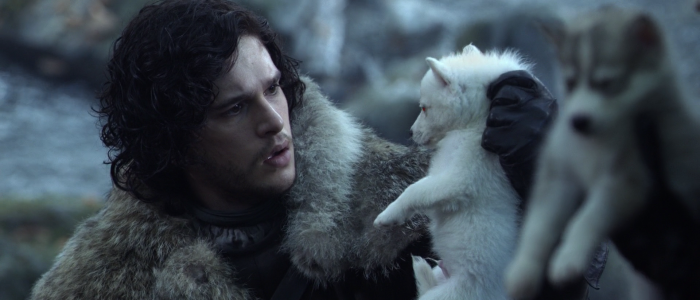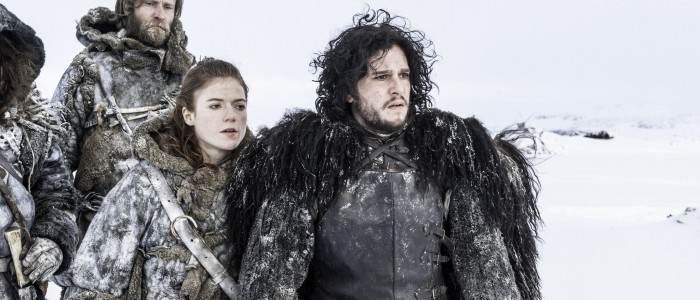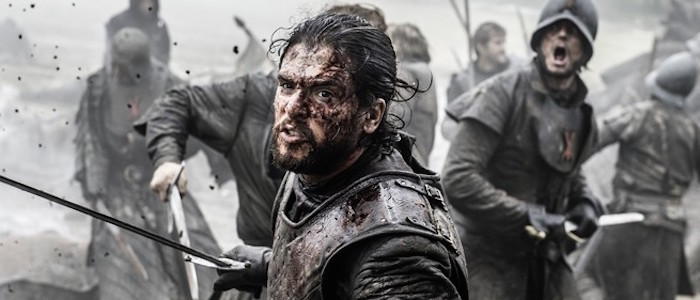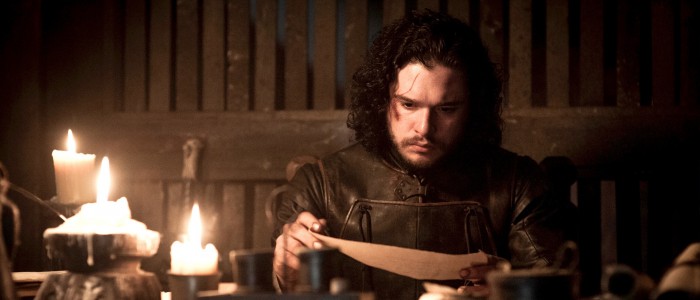'Game Of Thrones' Has A Jon Snow Problem
Forget the Red Wedding or the Battle of Hardhome: Game of Thrones' defining moment came in the penultimate episode of season one, when poor Ned lost his head. With the swing of Ilyn Payne's sword, Game of Thrones declared that it was not like other shows. This wouldn't be your typical adventure, where heroes are protected by plot armor and villains suffer from bad guy aim and everything ends in happily ever after. All men must die, and in Game of Thrones, any man could.
Which is all well and good, except that those formulas have stuck around for a reason — and as Game of Thrones nears the end, it seems to be having a harder and harder time sticking to that original directive. It's one thing to kill off Robb Stark in season three, when the show's epic plot felt like it was still just getting started; it'd be quite another to make us wait six seasons for Daenerys to set sail, only to dump her in Dragon's Bay before she reached the shores of Westeros. And nowhere is this tension more apparent than in the character of Jon Snow.
(Warning: MASSIVE SPOILERS AHEAD for the most recent episodes.)
A Traditional Fantasy Hero
In any other fantasy epic, Jon Snow would be the obvious hero. He's honorable, handsome, and handy with a sword. He comes with a mysterious parentage that promises grand plans, and just enough of an underdog backstory to make him sympathetic. If he's bit too stubborn or serious or simplistic, that's only because he's too much a Stark, which is to say he's too damn good.
In other words, Jon is exactly the kind of hero Game of Thrones seemed determined to eschew early on. Ned and Robb, who shared similar strengths and shortcomings, were killed for their inability to understand how the game was really being played. Jon Snow, on the other hand, has managed to survive all manner of ordeals, including death itself.
Jon isn't the only Game of Thrones character who began as a traditional epic adventure archetype, but most of the others who've endured have done so by adapting to the harsh realities of this specific universe. Sansa, a princess type who seemed destined to play damsel in distress, has hardened into a master manipulator in her own right. Arya, the spunky tomboy, is now a full-blown assassin. And Jon? He's barely changed at all. He's still the same old honorable, handsome, handy-with-a-sword hero he always was. He still knows nothing. And he's still on track to win everything.
Jon Snow Still Knows Nothing (And It's Becoming an Issue)
Recent episodes have emphasized how little Jon has truly evolved over the past six seasons. He still fails to grasp the extent to which the game of thrones is a battle of hearts and minds as much as it is one of bodies and swords. He doesn't think to ask Sansa how Ramsay Bolton would think, nor does he think to reinforce their alliance by praising her when she saves the day with the Knights of the Vale. He's still hotheaded to a fault, as when he gives up his only tactical advantage in the Battle of the Bastards to run headlong into the very trap that Sansa warned him about. He's still better at inspiring others to speak for him (Sam Tarly, Davos Seaworth, Lyanna Mormont) than he is at speaking for himself.
Worse, the same show that exploits every other character's weaknesses to make them pay seems more than happy to gloss over Jon's. His inability to bring together the Night's Watch and the wildlings gets him killed... only for Melisandre to magically bring him back to life. His blunder at the Battle of the Bastards almost causes the Stark forces to lose it all... only for Sansa to swoop in with a deus ex Littlefinger. His bastard status, a sore spot throughout his entire life, limits his rise to power... only it doesn't, because Lyanna comes through with a speech so rousing it convinces the Northern houses to declare him the new King in the North.
To be fair, Jon seems a little less naive than he did in season one, when he set out for the Night's Watch with childish fantasies of heroism and duty swirling in his head. He's killed humans and wights, gone undercover, made painful decisions, led the Night's Watch, and even found time to invent cunnilingus. But he's more or less the same exact person he always has been, despite many, many reasons for him to have grown as a character by now. When a character is able to literally come back from the dead without any meaningful change, it feels less like an inspired plot twist and more like a lazy shortcut. Seeing Jon break his sacred oath to the Night's Watch so he could get revenge on Ramsay Bolton — that would have been an interesting development for the character. Killing him so he can accomplish exactly the same thing without sullying his honor is a cheap trick.
Having It Both Ways
When it comes to Jon Snow, Game of Thrones wants to have it both ways. It wants us to think he might really die, which is why they crushed him half to death in the Battle of the Bastards. But I doubt many people were fooled, because the show can't kill him right now, not really. For starters, they've already pulled that move once before — that scene came just nine episodes after the last time Jon got killed off. But more importantly, he's too central to the narrative at this point. The reveal of his true parentage in the season six finale only further underlined just how important Jon is. Melisandre claimed Jon returned from the dead because the Lord of Light wasn't done with him yet, but she could have been talking about the show itself. Is there any real possibility that Jon Snow will die before the Night King breaches the Wall, or before he gets to cross paths with Dany? Technically, sure, anything is possible; practically, the odds seem vanishingly slim.
Jon's not the only character who's shielded by plot armor at this point. It seems equally unlikely that Daenerys or Tyrion will perish before making it across the Narrow Sea, or that Arya will meet her end before some of the names on her list do. But at least the other characters seem to have come by their continued survival honestly (give or take an Arya stabbing incident, anyway). Daenerys has her dragons. Tyrion has his wits. Arya has her supernatural killing abilities. If Jon Snow must live, so be it. But the show ought to let Jon's life unfold organically, instead of granting him miraculous reprieves time and time again.
How to Fix the Jon Snow Problem
The good news is that with another ten to fifteen episodes left in the series, it's not too late for the show to fix its Jon Snow problem. And I dearly hope it will. I'd love to see Jon's mistakes and shortcomings finally come around to bite him. In the season six finale, Littlefinger began worming his way between Sansa and Jon by pointing out that she, not Jon, should be the true leader of the North — and Jon Snow did nothing to quell those anxieties when he failed to even acknowledge Sansa's contributions as the Northmen rallied around him. Let's see that rift grow wider, and for Jon to pay for his obliviousness (as so many other great Game of Thrones characters have before him). We also saw that the Northmen are none too thrilled to share space with the wildlings, and we know that Jon was never able to quite unite the two sides at the Wall. Let's see his army begin to tear itself apart as Jon's leadership proves too ineffectual to keep them together.
Alternatively, let's see Jon finally evolve for real. One of the most interesting things about Dany's arc this season has been hints that this conquering queen may share her father's tendencies for madness and tyranny — and the efforts she's taken to ensure she doesn't become the next Mad Queen. Why not lean into Jon's very real shortcomings as a leader (his idealism and his obliviousness, for example), and show us how he learns to work around them? Or circle back to Jon's return from death, and delve a little deeper into the ways such a traumatic experience might have altered him forever?
The very things that made Game of Thrones so unique were its unpredictability, its messiness, its insistence on consequences. Unfortunately, those same qualities don't tend to make for very satisfying endings. On that level, it's understandable that Jon Snow continues to thrive. But the worst thing the show could do would be to put us through the wringer for seven or eight seasons, brutalizing the characters we love and leading us into dead ends and detours, only to finish as the very show it promised us it was not — you know, the kind of show where a clear-cut hero defeats the odds to bring about happily ever after.
So to the show, I'm begging you: keep Jon Snow around, have him marry Daenerys, give him a glorious hero's death, or put him on the Iron Throne — it's all fair game. Just please, make sure he's actually earned it by the time he gets there.




